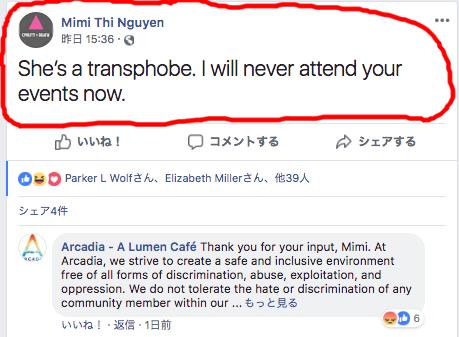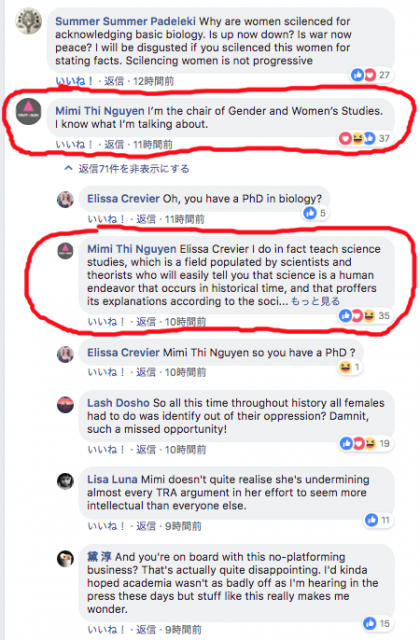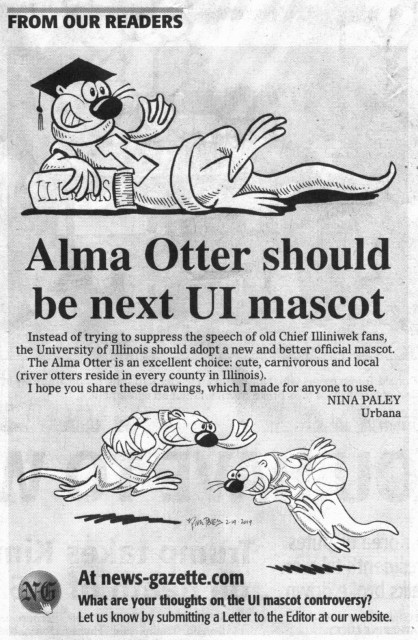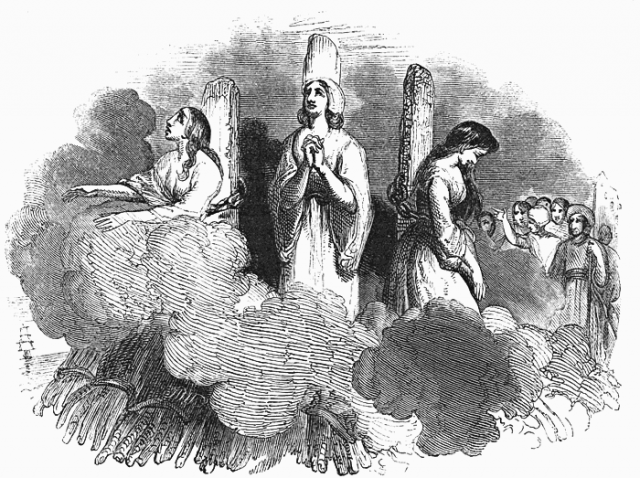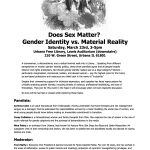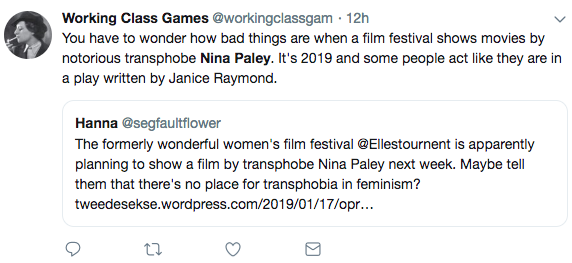February 28, 2019
In July of 2018, Arcadia, a cafe in Urbana, announced on Facebook an “Art Salon” at which my new film would be screened. The next day, Professor Mimi Thi Nguyen commented on Arcadia’s event page: “She’s a transphobe. I will never attend your events now.”
My crime was, months earlier, sharing on Facebook the following lyric: “If a person has a penis he’s a man.” At various times I have also shared such contentious views as, “women don’t have penises,” “sex is not gender,” “woman means adult human female,” and “everyone is free to identify however they wish, but not to force me to identify them the same way.” Nonetheless, “If a person has a penis he’s a man” is continually quoted as my greatest hit of so-called ‘hate speech.’ It is also a fact.
When asked by other commenters why my stating biological facts was ‘transphobic’ and grounds for no-platforming, Ms. Nguyen replied “I’m the chair of Gender and Women’s Studies. I know what I’m talking about.” Speaking not merely as an individual, but in her capacity as a UIUC faculty member, Ms. Nguyen threatened a local business and libeled a community member and encouraged others to join in.
Arcadia promptly cancelled the event.
That October, my film, Seder-Masochism, screened to enthusiastic audiences at the Vancouver International Film Festival. In attendance were film scholars Kristin Thompson and David Bordwell, frequent speakers at past Ebertfests, who loved the film and emailed Ebertfest director Nate Kohn to recommend it. Kohn replied they already knew about Seder-Masochism, and it was at the top of their list. Which makes sense, since it’s by an Urbana filmmaker (me) whose last film was a star at the festival (Sita Sings the Blues) and contains my late father’s voice, which is known to much of the festival’s audience (Hiram Paley used to be Mayor of Urbana, as well as a math professor at the U of I).
Later that Fall, I turned down an invitation to judge a major film festival in Buenos Aires, because its dates overlapped with Ebertfest. Since Seder-Masochism was “at the top of (their) list,” I didn’t want to miss it. In January, I emailed Nate Kohn and Chaz Ebert to ask if in fact Seder-Masochism would screen. For over a week, they didn’t respond. That same week, I was attacked by a Twitter mob accusing me of ‘hate speech,’ once again for having said “If a person has a penis he’s a man.” Then all trace of my film was removed from the website of a women’s film festival in Belgium, after they were bullied by a Belgian transactivist.
Still awaiting a response, at the end of January I emailed Ebertfest again. They replied: “Sorry, we don’t have room for it.” (Update 3-28-2019: Chaz Ebert confirms Ebertfest’s decisions had nothing to do with my no-platforming in Urbana and Beligium, and they were unaware of any controversy. )
I’m not entitled to be at any film festival, and the decisions of Ebertfest – a special event of the University of Illinois College of Media – are made behind closed doors, preventing any hope of accountability. But going from the top of Ebertfest’s list to “sorry there’s no room” in the midst of libel campaigns is consistent with the blacklisting and no-platforming of feminists at universities nationally and internationally. From the banishing of noted feminist speakers like Sheila Jeffreys and Julie Bindel; to the suppression of ‘politically incorrect’ research at Bath Spa University and Brown University; to secret blacklists of female academics uncovered at Goldsmiths University, the speech-suppressing behavior at the University of Illinois is consistent with unsavory developments around the world.
In 2017, the U of I adopted “Guiding Principles” on Freedom of Speech and Civic Engagement. I list some ways they are failing to uphold these principles:
-
- “We have a duty to vigorously and even-handedly protect community members against conduct that falls outside the First Amendment – including true threats, pervasive harassment, incitement to imminent lawless action, and libel…” Ms. Nguyen’s accusation, “she is a transphobe,” is libel. I do not fear or hate trans people. Although it shouldn’t be anyone’s business, I have had trans friends and lovers, and stood for the human rights of trans people, since before Ms. Nguyen entered college.
-
- “We will create conditions for a safe and robust exchange of viewpoints.” This has not happened at the U of I. While one-sided policies of “preferred pronouns” dominate, no voice is given to those who use English sex-based pronouns over newly imposed “gender identity” rules.
-
- “In all matters involving freedom of speech, the University of Illinois system will endeavor to maintain a high level of transparency.” I am confident anti-feminist blacklisting occurs here, as it does on many other campuses. Blacklisting is by its nature non-transparent and unaccountable, but its effects are devastating.
-
- “We will not condone shouting down or physically obstructing or threatening a speaker or the speaker’s audience.” Does this include on Social Media? Because Facebook is where Ms. Nguyen did just that, and got my event shut down.
-
- “We must always strive to be valued local partners, learning from and collaborating with the communities that are home to our universities and programs.” Bullying a local venue into shutting down a screening by a local artist achieves the opposite of that mission.
- “We owe our students opportunities for substantive civic engagement so that they graduate not only prepared for personal success but also knowing what is expected of them as productive global citizens.” Certainly the University has already failed its students and faculty by refusing any open discussion of genderist ideology and policies. This failure to foster free speech has spilled beyond campus and into the surrounding cities of Urbana-Champaign, harming the community.
HARMS
Many local residents were looking forward to the event at Arcadia. Due to the bullying by Ms. Nguyen, representing the University of Illinois, and her associates, the event was cancelled. Many more locals hoped Seder-Masochism would screen at Ebertfest this year. Now, they will not see it.
Many in this college town are afraid to voice support for me, or express any gender-critical thought, for fear of being branded “transphobic.” Academics who even question ‘gender identity’ have been disciplined or denounced in open letters; those who express fully gender critical views have lost their jobs. Between that and the imposition of ‘preferred pronouns,’ requiring the speaker to suppress their correct recognition of biological sex in favor of compelled speech – that is, lying – University employees, their spouses, and friends, feel compelled to keep quiet.
So, instead of the “opportunities for substantive civic engagement” promised in the University’s Principles, the University instead fosters a climate of fear and silence in the wider community.
Beyond this harm to our community, I have been harmed personally as well. I can’t calculate the cost this has had on my professional reputation, career, and livelihood. I have certainly suffered psychological harm: being falsely accused and shut down in my hometown, with no accountability for the accusers, evokes a despair I had previously only read about in books like “The Crucible” and histories of witch trials.
REMEDIES
The University needs to protect speech.
I acknowledge the University is in a bind. Recent State interpretations of Title IX have – perhaps unwittingly – redefined ‘sex’ to include ‘gender identity.’ As long as Title IX fails to uphold its original purpose – protections based on sex – and instead protects incoherent, ill-defined, and fundamentally sexist concepts of ‘gender identity,’ it is at odds with the First Amendment – and with itself.
The University’s Student Affairs web page states:
“We will continue to protect and treat all students according to their gender identities and gender expressions, honoring chosen names, pronouns, and restroom access, as is current campus policy.”
‘Preferred pronouns’ are compelled speech, forcing the speaker to contradict their own recognition of another’s sex. This compulsion violates the First Amendment. But ‘preferred pronouns’ also violate Title IX itself, insofar as it still protects sex. Although trans activists vehemently deny this, there is ample evidence that some trans-identified males are autogynephiles – that is, fetishists who are sexually aroused by imagining themselves as women. Being forced to call such men “she” is forced participation in sexual activity without consent. That is just one way privileging ‘gender identity’ over sex is institutionalized sexual coercion.
‘Sex’ and ‘gender identity’ are fundamentally mutually exclusive; you cannot protect one without delegitimizing the other. The University considers failure to use ‘preferred pronouns’ harassment against the individual who imposes them. But ‘preferred pronouns’ themselves are harassment, including sexual harassment, against individuals compelled to use them.
My plea to the University is to reaffirm its commitment to Free Speech and acknowledge the untenable and inconsistent demands added to Title IX by the redefinition of sex. It is tragic that the former integrity of Title IX, which has been instrumental in providing sex-based protections and opportunities for women and girls, is now in opposition to the First Amendment. Free Speech is important. Sex-based protections are important. Redefining ‘sex’ to include ‘gender identity’ is an assault on both.
On an immediate and practical level, the University should:
Assure the right of all employees and students to use whatever pronouns they see fit;
Assure the right of all students and employees to question and discuss current “gender identity” politics without fear of libel or punishment, and;
Host meaningful discussion on this subject. Feminist Journalist Meghan Murphy is available to debate anyone on the topic, “Does Trans Activism Negatively Impact Women’s Rights?” The University would do well to host such a debate here.
Finally, having lost two screening opportunities in my hometown because of the University’s negligence, I would like the University to sponsor a screening of my film Seder-Masochism for the community.
Sincerely,
–Nina Paley
Director, Seder-Masochism and Sita Sings the Blues
Urbana, IL
ninapaley.com

